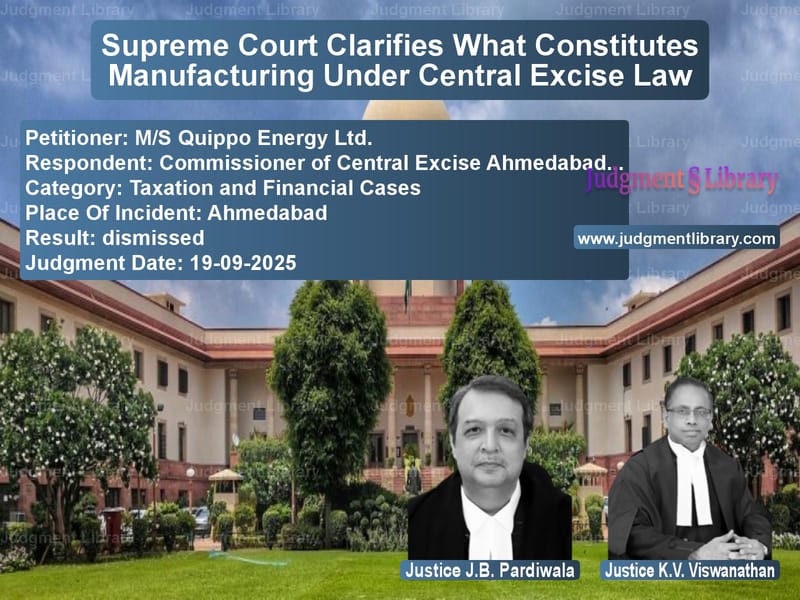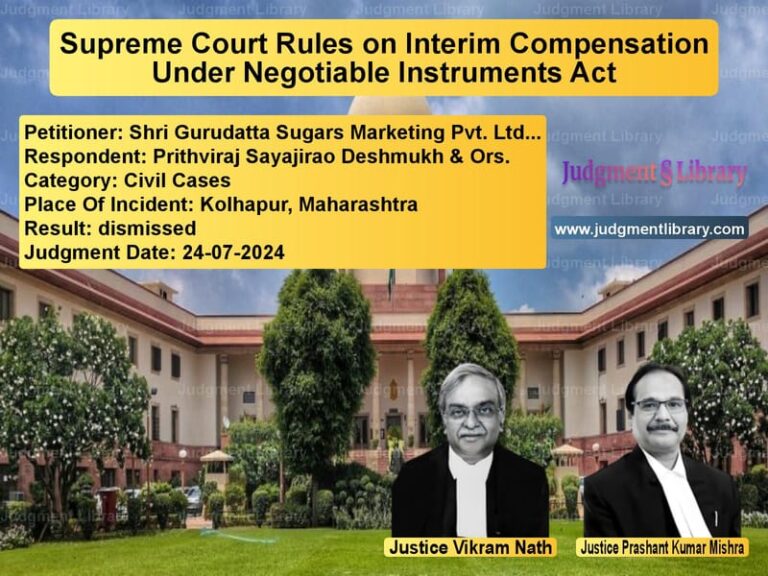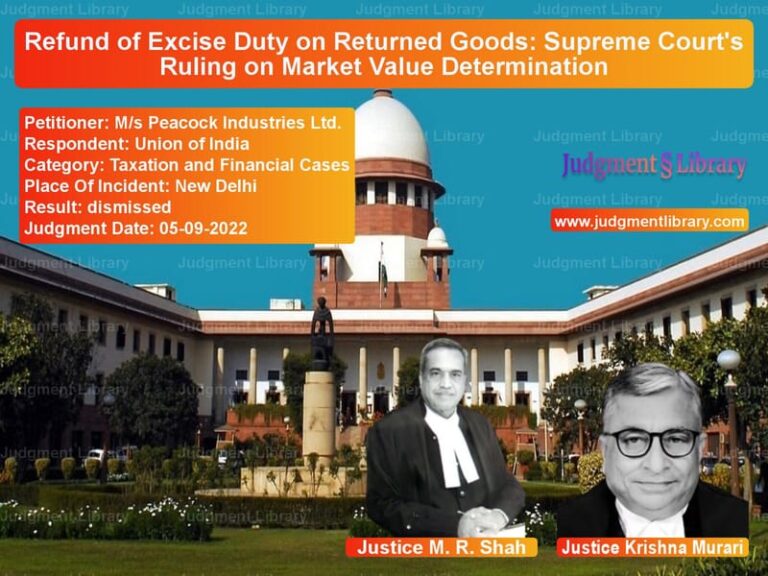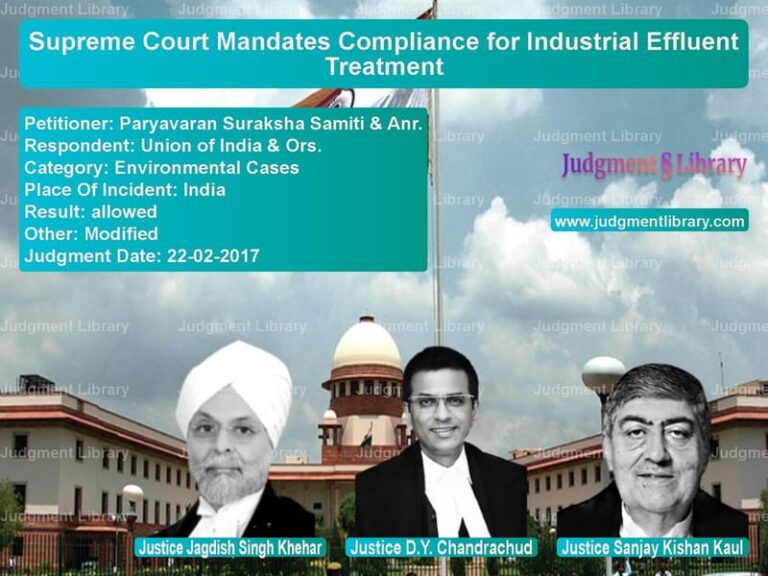Supreme Court Clarifies What Constitutes Manufacturing Under Central Excise Law
In the complex world of taxation and manufacturing, the line between mere processing and actual manufacturing can often become blurred, leading to significant legal disputes between businesses and tax authorities. This was precisely the case when M/s Quippo Energy Ltd found itself in a legal battle with the Commissioner of Central Excise Ahmedabad over whether their process of converting imported gas generating sets into containerized power packs amounted to ‘manufacture’ under the Central Excise Act, 1944. The dispute, which traveled through multiple levels of the judicial system, ultimately reached the Supreme Court of India, where a landmark judgment was delivered that provides crucial clarity on what truly constitutes manufacturing for excise duty purposes.
The case centered around Quippo Energy’s business of providing containerized gas generating sets, known as Power Packs, on a lease basis. The company imported Gas Generating Sets (Gensets) consisting of an engine coupled with an alternator on a common base frame. To make these Gensets suitable for their leasing business, the company placed them in steel containers and fitted them with various components including radiators, ventilation fans, air filter units, oil tanks, pipes, pumps, valves, and silencers. The company argued that these activities were merely for logistical convenience and did not transform the essential nature of the product. However, the excise authorities thought otherwise, leading to a legal battle that would test the very definition of manufacturing under Indian tax law.
The Legal Battle and Competing Arguments
The appellant, M/s Quippo Energy Ltd, represented by Ms. Charanya Lakshmikumaran, mounted a vigorous defense against the excise department’s claim. The learned counsel submitted that “A process would amount to ‘manufacture’ if the following two-fold test, as explained by this Court in a catena of judgments, is satisfied: (i) Whether by the said process a different commercial commodity comes into existence or whether the identity of the original commodity ceases to exist (Transformation Test); and (ii) Whether the commodity which was already in existence would be of no commercial use but for the said process (Marketability test).” She vehemently argued that “The two limbs must be satisfied cumulatively” and that in their case, neither test was met.
The appellant’s counsel elaborated that “The transformation test is not satisfied as the product remains a Genset performing the function of generating electricity and does not transform into another distinct commodity, whereby its original identity as a Genset ceases to exist.” She described the various accessories as serving “the sole purpose of making the generating set fit to work within a container box (for logistical purposes)” and argued that “Mere enhancement of the functionality with the use of these accessories will not detract from the fact that the product continues to remain a generating set.”
On the marketability aspect, the counsel contended that “The marketability test is also not satisfied, as it cannot be said that the product, in its imported form, served no purpose without the activity undertaken by the appellant. It was capable of generating electricity and was commercially available for such purpose de hors the accessories.”
Opposing these arguments, Ms. Nisha Bagchi, the learned senior counsel appearing for the Revenue, presented a compelling case for the excise department. She argued that “The findings recorded in the impugned order have been arrived at after considering all the relevant material and applying the established test for determining ‘manufacture’. Thus, the impugned order is unassailable in law as well as on the facts.”
The Revenue’s counsel emphasized that “The Genset in its imported form is not functional. It is undisputed that the appellant is not selling the imported Genset as such. The Genset is containerized using various locally procured parts to transform it into a functional Power Pack. The Power Pack is a different product having a distinct character, name and use and is marketable as such.” She particularly stressed the distinction between parts and accessories, arguing that “In this context, the characterisation of components such as radiator, ventilation fan, etc., by the appellant as ‘accessories’ is wholly untenable. The Genset, once placed in the container, would not function without these components, and thus these components should rightly be termed as ‘parts’ of the Power Pack.”
The Supreme Court’s Elaborate Analysis
The Supreme Court bench comprising Justice J.B. Pardiwala and Justice K.V. Viswanathan delivered a comprehensive judgment that delved deep into the legal definition of manufacturing. The Court began by examining Section 2(f) of the Central Excise Act, 1944, which defines ‘manufacture’ to include “any process—(i) incidental or ancillary to the completion of a manufactured product; (ii) which is specified in relation to any goods in the Section or Chapter Notes of the Fourth Schedule as amounting to manufacture.”
The Court then traced the judicial history of interpreting what constitutes manufacturing, starting with the landmark case of Union of India v. Delhi Cloth & General Mills, where it was established that “‘manufacture’ implies a change, but every change is not manufacture and yet every change of an article is the result of treatment, labour and manipulation. But something more is necessary and there must be transformation; a new and different article must emerge having a distinctive name, character or use.”
The judgment extensively discussed the two-fold test established in J.G. Glass Industries Ltd & Ors: “a. Fundamental Change Test: The first criterion is to determine if the process results in a new commercial item being created, or if the original item’s identity is fundamentally altered or ceases to exist. This means assessing whether a transformation occurs such that a distinct product with a new name, identity, character, or use emerges; b. But for the process Test: The second criterion evaluates whether the product that existed before the process would be commercially useless or serve no purpose without undergoing that specific process.”
The Court particularly emphasized the clarification provided in Servo-Med Industries, where it was held that “The second test, namely that the commodity which was already in existence will serve no purpose but for a certain process must be understood in its true perspective. It is only when a different and/or finished product comes into existence as a result of a process which makes the said product commercially usable that the second test laid down in the judgment leads to manufacture.” The Court further clarified that “both the prongs of the two-prong test must be fulfilled in order for an activity to amount to ‘manufacture’.”
The Court’s Application of Legal Principles to the Facts
In applying these legal principles to Quippo Energy’s case, the Supreme Court made several crucial observations. The Court noted that “Determining the ‘character’ and ‘identity’ of goods is an inherently fact-specific inquiry, necessitating assessment on a case-to-case basis. Given the vast diversity of products and manufacturing processes, it is impossible to lay down one universal definition for these terms.”
The Court then addressed the critical distinction between ‘parts’ and ‘accessories,’ stating that “A part is an integral / constituent component which renders the article complete and functional i.e., the article would not be able to fulfill its primary function without this component. An accessory on the other hand is a component which while not being essential to the primary functioning of the article, is used in conjunction with the article and adds supplemental/secondary value by providing for additional beauty, elegance, comfort or convenience of use in relation to that article.”
Applying this distinction, the Court found that “the additional components should be considered as ‘parts’ of the Power Pack. The appellant itself has admitted to the fact that once the Genset is placed in the steel container, these additional components, such as the radiator, ventilator fan and air filter unit, are required for its effective functioning.” The Court reasoned that “without these additional components, the Power Pack would not produce electricity within the steel container and thereby be able to fulfil its primary function. Thus, these additional components are not mere ‘accessories’ attached for the sake of convenience.”
The Court also rejected the appellant’s argument that the end-use remained the same, observing that “The contention of the appellant that the end-use of both products is merely the ‘generation of electricity’ is an oversimplification that conflates the core function of a product with its functional utility. The Genset at the time of the import was in a form that was suitable/intended for permanent installation. The process undertaken by the appellant imparts the core functional utility of portability to the Genset, a utility that was non-existent in the product at the time of its import. This is not a minor, value-added feature, it is the defining attribute from which the final product derives its entire identity and character.”
The Final Verdict and Its Implications
After thorough analysis, the Supreme Court concluded that “In the facts of the present case, both the transformation test and the marketability test stand fulfilled. The process of placing the Genset within the steel container and fitting that container with additional, integral components brings into existence a new, distinct, and marketable commodity. This process would thus amount to ‘manufacture’ under Section 2(f)(i) of the Act, 1944. Consequently, the appellant is liable to pay excise duty on the goods manufactured.”
The Court’s judgment provides significant clarity on the interpretation of what constitutes manufacturing under excise law. By emphasizing that both tests must be applied cumulatively and that the determination depends on the specific facts of each case, the judgment offers guidance to businesses and tax authorities alike. The distinction drawn between parts and accessories, and the recognition that functional utility can define a product’s character, represent important contributions to Indian excise jurisprudence.
This landmark decision reinforces the principle that taxability depends on substance over form, and that processes which fundamentally transform a product’s identity, character, and functional utility will typically qualify as manufacturing activities subject to excise duty. For businesses engaged in processing or assembling activities, the judgment serves as a reminder that the mere fact that a product serves the same broad function before and after processing does not necessarily mean that manufacturing has not occurred.
Petitioner Name: M/S Quippo Energy Ltd..Respondent Name: Commissioner of Central Excise Ahmedabad – II.Judgment By: Justice J.B. Pardiwala, Justice K.V. Viswanathan.Place Of Incident: Ahmedabad.Judgment Date: 19-09-2025.Result: dismissed.
Don’t miss out on the full details! Download the complete judgment in PDF format below and gain valuable insights instantly!
Download Judgment: ms-quippo-energy-lt-vs-commissioner-of-cent-supreme-court-of-india-judgment-dated-19-09-2025.pdf
Directly Download Judgment: Directly download this Judgment
See all petitions in Income Tax Disputes
See all petitions in GST Law
See all petitions in Tax Evasion Cases
See all petitions in Customs and Excise
See all petitions in Tax Refund Disputes
See all petitions in Judgment by J.B. Pardiwala
See all petitions in Judgment by K.V. Viswanathan
See all petitions in dismissed
See all petitions in supreme court of India judgments September 2025
See all petitions in 2025 judgments
See all posts in Taxation and Financial Cases Category
See all allowed petitions in Taxation and Financial Cases Category
See all Dismissed petitions in Taxation and Financial Cases Category
See all partially allowed petitions in Taxation and Financial Cases Category







